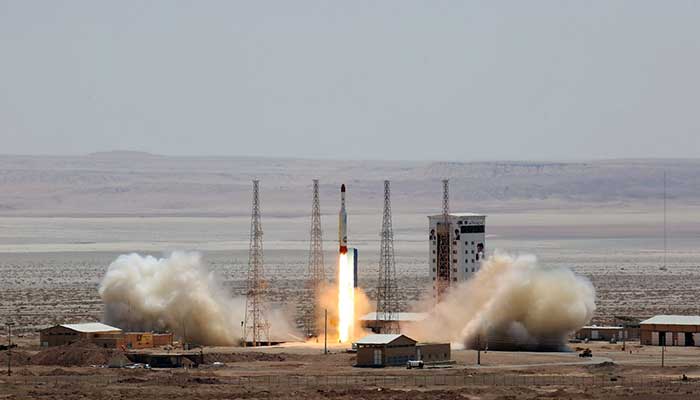Iran counts down to launch new satellite
Head of Iran's space agency said 113-kilogramme Zafar would be launched into orbit 530 km above Earth
TEHRAN: Iran started counting down on Sunday to the launch within hours of a scientific observation satellite that is part of a programme the United States has previously described as a "provocation".
Arch foes Iran and the United States have appeared to be on the brink of an all-out confrontation twice since last year.
Long-standing acrimony between Tehran and Washington was exacerbated in 2018 when US President Donald Trump unilaterally withdrew from a deal that froze Iran's nuclear programme, before issuing new demands for its development of ballistic missiles to be curtailed.
Washington has also raised concerns in the past about Tehran's satellite programme, saying the launch of a carrier rocket in January 2019 amounted to a violation of curbs on its development of ballistic missiles.
Iran maintains it has no intention of acquiring nuclear weapons, and says its aerospace activities are peaceful and comply with a UN Security Council resolution.
"Beginning countdown to launch #Zafar_Satellite in the next few hours... In the Name of God," Iran's telecommunications minister, Mohammad Javad Azari Jahromi, wrote on Twitter.
He did not specify when the satellite would be launched.
On February 1, the head of Iran's space agency said the 113-kilogramme Zafar — Victory in Farsi — would be launched into orbit 530 kilometres above Earth by a Simorgh rocket.
Its "primary mission" would be collecting imagery, Morteza Berari told AFP, adding that Iran needed such data to study earthquakes, deal with natural disasters and develop its agriculture.
The Zafar was designed to remain operational for "more than 18 months", he added.
While the Islamic republic´s satellite programme has concerned some Western countries, Berari said Iran supported the "peaceful use of outer space" and that its activities were "transparent".
'Try again'
In January 2019, Tehran announced that its Payam — Message in Farsi — satellite had failed to reach orbit, after authorities said they launched it to collect data on the environment in Iran.
The United States said the launch of the carrier rocket was a violation of a 2015 UN Security Council resolution endorsing an international accord on curbing Tehran´s nuclear programme.
Resolution 2231 called on Iran to refrain from any activity related to ballistic missiles capable of delivering nuclear weapons.
Tehran confirmed in September that an explosion occurred at one of its satellite launch pads due to a technical fault, and slammed Trump for "gleefully" tweeting about it at the time.
Trump said the US had nothing to do with what he called a "catastrophic accident" at Semnan Space Centre in a tweet alongside a high-resolution picture pointing to apparent damage at the site.
The Zafar´s scheduled launch comes days before the 41th anniversary of the Islamic Revolution and crucial parliamentary elections in Iran.
It also comes at a time of heightened tensions between Tehran and Washington, after a January 3 US drone strike killed top Iranian general Qasem Soleimani in Baghdad.
Iran retaliated days later by firing a wave of missiles of missiles at American troops stationed in Iraq.
Its defence forces had been braced for US retaliation when they shot down a Ukraine International Airlines flight a few minutes after take-off from Tehran on January 8.
Replying to a tweet that asked what if Zafar fails like it predecessor, Jahromi said "we will try again".
Iran´s internet services have faced cyber attacks for the past two days, according to the ministry. Officials have not elaborated on the source of the attack or its likely motives.
-
Martha Stewart on surviving rigorous times amid upcoming memoir release
-
18-month old on life-saving medication returned to ICE detention
-
Cardi B says THIS about Bad Bunny's Grammy statement
-
Chicago child, 8, dead after 'months of abuse, starvation', two arrested
-
Funeral home owner sentenced to 40 years for selling corpses, faking ashes
-
Australia’s Liberal-National coalition reunites after brief split over hate laws
-
Savannah Guthrie addresses ransom demands made by her mother Nancy's kidnappers
-
Washington Post CEO William Lewis resigns after sweeping layoffs












